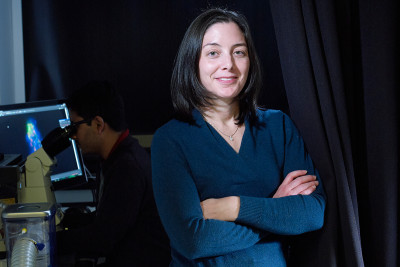
Emily Foley, a laboratory investigator in the Sloan Kettering Institute Cell Biology Program, studies the molecular mechanisms of mitosis, the process of cell division. She earned her PhD in biological chemistry from Harvard University in 2006 and completed postdoctoral work in 2012 at The Rockefeller University in New York City.
In a recent interview, Dr. Foley, who joined Memorial Sloan Kettering last year, discussed her path to becoming a cell biologist, why she came to Memorial Sloan Kettering, and her goals for the research she is pursuing.
What is the main focus of your research?
Our work aims to understand the nuts and bolts of how one cell divides into two. One common hallmark of all human cancers is uncontrolled cell proliferation. The cancer cells simply divide more frequently than normal cells. Oftentimes, they make mistakes in how they distribute the cell’s DNA into the two daughter cells.
Each time a cell divides it must first duplicate its chromosomes, long strands of DNA, and then partition them evenly into two daughter cells, so that the cellular “instructions” remain the same from one cell generation to the next. In cancer cells, the quality-control mechanisms that ensure the fidelity of chromosome segregation are often compromised.
We’re interested in understanding both the quality-control mechanisms that exist in a normal cell and, more specifically, how those quality-control mechanisms are perturbed in a cancer cell.
What factors led you to science and research?
My first entry into science was in high school, and it was a complete accident. The town I lived in was also the home of a genetic testing company that did karyotype analysis, which examines chromosomes in cells to help identify genetic disorders or diseases.
My summer job was to take the photos of chromosomes produced from patient samples, cut them out, and align and organize them. It was my first experience seeing that science could be a profession and something that was interesting and useful.
My next lucky break was getting a scholarship to study biochemistry at Colorado College. I did several summer internships while I was there that eventually cemented in my mind that I liked doing research and that I enjoyed the challenge of the lab environment.
My high school experience karyotyping chromosomes may have had some part in guiding my research choice while I was a PhD student at Harvard. There, I worked to understand the process of chromosome duplication, and I discovered a quality-control mechanism that ensures chromosomes are copied once, and precisely once, before cell division.
As a postdoctoral researcher at The Rockefeller University, I again kept my focus on chromosomes, this time studying how sets of chromosome copies segregate to opposite sides of a dividing cell, a process I continue to work on in my lab.
How did this interest lead you to oncology?
Cancer cells have many changes in their DNA; these changes can occur in a variety of ways, including how the chromosomes are copied and how they’re distributed when cells divide.
While my scientific training has focused on understanding how normal cells “get it right” to execute these events flawlessly, as an independent researcher at Memorial Sloan Kettering, I now choose to incorporate the added question of understanding how cancer cells often “get it wrong” and make mistakes during cell division.
What brought you to Memorial Sloan Kettering?
The reason I came here is that the research support here is second to none, and therefore, this is a great place to be a young investigator setting up a lab. At Memorial Sloan Kettering, you’re really only limited by the questions you decide to ask. The collaborators are here, the infrastructure is here, everything is here – we just need to come up with the right questions.
The environment is such that it’s impossible to overlook the need to develop improved cancer treatments. For me, this has the effect of focusing my thoughts and energy on exploring questions that really matter.
What excites and challenges you about your research?
What I find exciting on a day-to-day basis is to watch cells dividing, both normal cells and cancer cells. We do very sophisticated imaging to look at changes in the fidelity of how these cells divide their chromosomes.
To come to work each day and know that I have everything at my disposal to do these experiments is wonderful. The research environment here is rightly focused on improving cancer treatment, and I’m challenged to learn from other labs and investigators here to make sure I guide the research we do to try to improve how patients with cancer are actually treated.
What’s next for your research?
We are very interested in a class of modern chemotherapy drugs that acts by perturbing cell division, the process we study every day under the microscope. A long-term goal for me is to understand on a mechanistic level how perturbing cell division kills a cell.
Because believe it or not, although these chemotherapy drugs have been used for many years, we don’t quite understand on a molecular level how they work. If we did, we would know more about how we can improve current drugs and design drugs that more effectively kill dividing cancer cells.